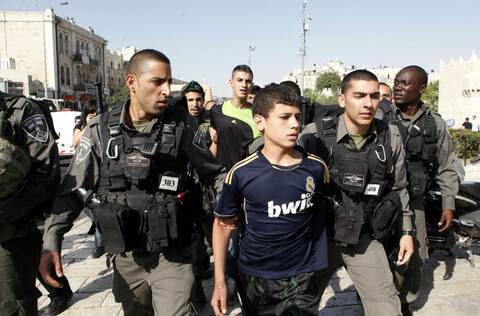The Electronic Intifada 6 May 2015
Israeli forces shot and killed five Palestinians in the occupied West Bank during the month of April.
The first Palestinian child to be killed by Israel this year, 17-year-old Ali Abu Ghannam was slain by Border Police at a checkpoint in the al-Tur neighborhood of Jerusalem on 24 April. The police claimed that the teen charged at occupation forces with a knife but Abu Ghannam’s family dismissed the accusation as a fabrication to cover up a killing “in cold blood.” His mother told media that her son had gone out that night to attend a wedding party, and was not carrying any weapon.
In a similar case, 18-year-old Muhammad Yahiya died of bullet wounds sustained near Israel’s wall in Araqa, a village near Jenin. The youth’s father said that his son was “assassinated in cold blood” while walking with his friends after a family wedding. An Israeli army spokesperson said that Yahiya was shot after he “refused to halt” while “attempting to breach the security fence.”
Muhammad Karakra was shot dead at Sinjil junction near Shilo, an Israeli settlement north of Ramallah on 8 April after allegedly stabbing two Israeli soldiers, one of whom was critically injured.
In Beit Ommar village near Hebron, Ziyad Awad, 27, was killed when soldiers opened fire on the funeral of his cousin, Jaafar Awad, 22, who died from complications stemming from a severe illness contracted while in Israeli prison.
Twenty-year-old Mahmoud Abu Jheisha was killed by Israeli forces outside the Ibrahimi Mosque in Hebron after allegedly stabbing a soldier, who was reported as moderately injured.
Also in the West Bank, two pregnant Palestinian women and their husbands were injured when they were run over by an Israeli-plated vehicle near al-Nabi Elias village in the Qalqiliya area. The driver fled the scene.
A 25-year-old Israeli man died after he was hit by a car driven by a Palestinian man at a bus station in East Jerusalem; an Israeli woman was seriously wounded in the same incident. Palestinian media reported that the motorist claimed it was an accident but Israeli media reported that the man confessed that it was a planned attack.
Gaza
Two young Palestinian men were reported killed in accidents while working in tunnels used to smuggle commercial goods from Egypt into the besieged Gaza Strip.
Israeli forces continued to open fire on Palestinian civilians in Gaza’s boundary areas on a daily basis, causing injuries. Meanwhile, Egyptian naval forces fired at Palestinian boats approaching Egyptian waters.
Rafah crossing, the sole entry and exit point for the vast majority of Gaza’s 1.8 million residents, remained closed during April. The crossing has been closed since late October except for 12 days on which it was opened with restrictions.
A Palestinian child was killed mid-month when a fire broke out in his family’s home north of Gaza City. The fire was caused by candles lit during a power outage.
By the end of the month, electricity outages increased from 12 to 16 hours per day to up to 20 hours per day after fuel delivery for the operation of Gaza’s power plant was halted during Israeli holidays and due to damage to fuel pipelines on the Palestinian end, the United Nations monitoring group OCHA reported.
Meanwhile, six months after a ceasefire ended 51 days of intensive shelling of Gaza, there is still virtually no reconstruction of the tens of thousands of homes destroyed there.
Yarmouk
On 29 April, Ban Ki-moon, the UN secretary-general, condemned Syrian government shelling and aerial bombardment of Yarmouk refugee camp near Damascus.
Days earlier, Syria’s envoy to the UN told the Security Council that the camp had been vacated and only terrorists and male civilians remain.
Thousands of Yarmouk’s remaining 18,000 residents fled last month after the Islamic State group, also known as ISIS or ISIL, infiltrated the camp and entered into battle with Palestinian armed groups in the camp.
Once home to the largest Palestinian community in Syria, most of Yarmouk’s 150,000 residents fled after it became an arena of fierce fighting between opposition and government forces in late 2012. Dozens of residents starved to death there after government forces and allied groups in the camp imposed an ongoing siege on the camp.
The commissioner-general of UNRWA, the UN agency for Palestine refugees, said that thousands of civilians remained in Yarmouk late last month.
Tags
- photography
- photostory
- month in pictures
- Ali Abu Ghannam
- Muhammad Yahiya
- Muhammad Karakra
- Ziyad Awad
- Jaafar Awad
- Mahmoud Abu Jheisha
- Yarmouk
- West Bank
- al-tur
- Jerusalem
- Araqa
- Jenin
- Israel's wall in West Bank
- Israeli settlements
- Shilo
- Ramallah
- Beit Ommar
- Hebron
- Ibrahimi Mosque
- al-Nabi Elias
- Qalqiliya
- East Jerusalem
- tunnels
- Egypt
- Rafah crossing
- OCHA
- Damascus
- Syria
- ISIS
- Ban Ki-moon
- UNRWA


